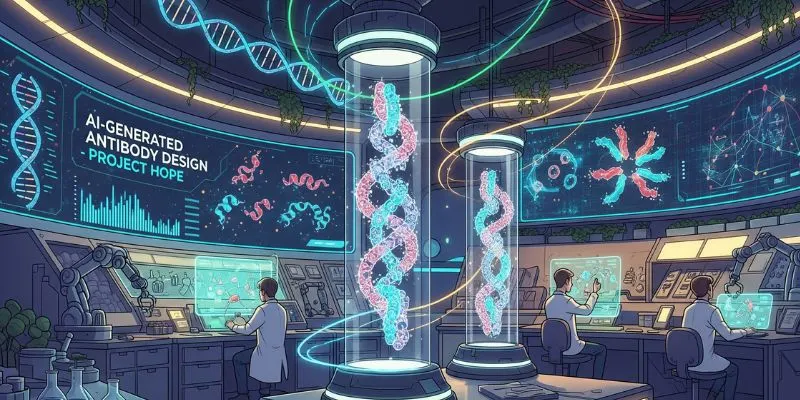Chai Discovery raised $70 million in Series A funding, led by Menlo Ventures, to advance its AI-driven drug discovery platform.
The company’s Chai-2 model achieves a nearly 20% hit rate for fully de novo antibody designs—over 100x higher than established methods.
Former Pfizer Chief Scientific Officer Mikael Dolsten joins the board, infusing deep pharma expertise into the leadership team.
Founded in 2024, Chai Discovery partners with top investors including OpenAI and aims to rapidly accelerate the development of new therapeutics.

Speed: A process that took years and millions of dollars can now yield working antibodies in as little as two weeks.
Versatility: Chai-2 supports formats including nanobodies and miniproteins—crucial for next-generation therapeutics.
Robustness: Lab results show a 15-20% “hit rate” for new, previously untargeted antigens—a more than 100x improvement over older computational approaches.
Minimal screening: Chai-2 generates a shortlist of high-potential candidates, eliminating massive expensive screens.
The upshot? Drug developers now have a shot at previously “undruggable” or prohibitively expensive targets.
Chai-2 found a solution in hours to one antibody problem that had cost another company over $5 million and three years, with validation happening in under two weeks.
Using only a target antigen and epitope, Chai-2 can generate—in a “Photoshop for proteins” style—designs tailored to exactly fit their biological target.
Antibody drugs, vaccines, and emerging therapies could become dramatically faster and cheaper to develop, bringing new hope for diseases that have stymied researchers for decades.
Chai Discovery’s commercial rollout will be selective, focusing on responsible deployment and vetted partnerships.

Editorial Team
futureTEKnow is a leading source for Technology, Startups, and Business News, spotlighting the most innovative companies and breakthrough trends in emerging tech sectors like Artificial Intelligence (AI), Robotics, and the Space Industry.
Discover the companies and startups shaping tomorrow — explore the future of technology today.

This article explores 10 AI-driven supply chain optimization companies to watch in 2026, highlighting how their platforms improve forecasting, logistics, and end-to-end visibility for modern operations.

AWS frontier agents introduce a new era of autonomous AI coders that can build, secure, and run applications for days at a time, acting like virtual teammates across dev, security, and DevOps while engineers retain final control over production changes.

Explore the cutting-edge ways AI is enhancing Lean Six Sigma, from real-time process insights to predictive controls, ushering in a new era of operational excellence and efficiency.

Facing supply chain challenges in 2025? High-performing teams leverage AI for risk management, demand forecasting, supplier analytics, and end-to-end visibility to ensure business continuity and resilience.

Craft an AI-powered supply chain Center of Excellence that unifies control tower visibility, analytics, and inventory optimization into one strategic hub. Explore this blueprint to learn how a modern supply chain CoE drives resilience, smarter decisions, and operational excellence in the age of AI.

Supply chain leadership is being redefined by AI, intelligent automation, and agentic decision-making, demanding leaders who can engineer end-to-end intelligence rather than simply manage workflows. This article explores how next-generation supply chain leaders will combine data, algorithms, and human judgment to build resilient, adaptive, and high-performing global operations.

Bridgit Mendler’s Northwood Space is pioneering mass-produced ground stations, enabling scalable, high-speed connectivity for the new era of satellite networks and megaconstellations.

SpaceX aims to nearly double launches from Vandenberg in 2025, facing support from federal agencies but strong objections from the state and local communities.

Traditional Medicare will pilot AI-assisted prior authorization in 2026 across six states, focusing on high-risk outpatient services. Clinicians retain final say, but incentives and access concerns loom as CMS tests fraud reduction and “gold card” exemptions. Here’s what providers and patients should know.

OpenArt’s new “one-click story” compresses scripting, visuals, and edits into ready-to-post short videos—fueling viral growth and a fresh IP debate. We break down how it works, adoption signals, what’s next (multi-character, mobile), and practical guardrails creators and brands should follow to stay original and compliant.

OpenAI’s o3 swept the Kaggle AI chess tournament, defeating xAI’s Grok 4–0. The victory fueled the intense rivalry between Altman and Musk, reshaping AI benchmarks.

NASA and Google’s AI-powered Crew Medical Officer Digital Assistant enables autonomous diagnoses for astronauts on Mars missions, redefining remote healthcare for space and Earth.
To provide the best experiences, we use technologies like cookies to store and/or access device information. Consenting to these technologies will allow us to process data such as browsing behavior or unique IDs on this site. Thanks for visiting futureTEKnow.